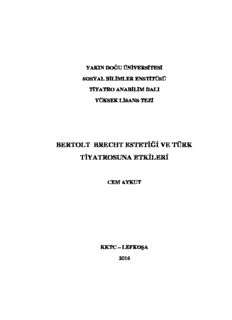
bertolt brecht estetiği ve türk tiyatrosuna etkileri PDF
Preview bertolt brecht estetiği ve türk tiyatrosuna etkileri
YAKIN DOĞU ÜNİVERSİTESİ SOSYAL BİLİMLER ENSTİTÜSÜ TİYATRO ANABİLİM DALI YÜKSEK LİSANS TEZİ BERTOLT BRECHT ESTETİĞİ VE TÜRK TİYATROSUNA ETKİLERİ CEM AYKUT KKTC – LEFKOŞA 2016 YAKIN DOĞU ÜNİVERSİTESİ SOSYAL BİLİMLER ENSTİTÜSÜ TİYATRO ANABİLİM DALI YÜKSEK LİSANS TEZİ BERTOLT BRECHT ESTETİĞİ VE TÜRK TİYATROSUNA ETKİLERİ CEM AYKUT DANIŞMAN DOÇ.DR ZERRİN AKDENİZLİ KKTC – LEFKOŞA 2016 iii YEMİN METNİ Yüksek Lisans Tezi / Proje olarak sunduğum ‘’ BERTOLH BRECHT ESTETİĞİ VE TÜRK TİYATROSUNA ETKİLERİ ‘’ adlı çalışmanın, tarafımdan, akademik kurallara ve etik değerlere uygun olarak yazıldığını ve yararlandığım eserlerin kaynakçada gösterilenlerden oluştuğunu, bunlara atıf yapılarak yararlanılmış olduğunu belirtir ve bunu onurumla doğrularım. 27/01/2016 Cem AYKUT iv ÖZET Yüksek Lisans Tezi BERTOLT BRECHT ESTETİĞİ VE TÜRK TİYATROSUNA ETKİLERİ Cem AYKUT Yakın Doğu Üniversitesi Sosyal Bilimler Enstitüsü Tiyatro Anabilim Dalı Dramatik Yazarlık ve Dramaturji Programı Bertolt brecht “ Eleştirel toplumcu gerçekçi tiyatro olarak epik tiyatroyu kuramsal ve uygulayımsal olarak temellendirmiş ; başlıcalıkla Meyerhold ve Piscator deneyimlerini özümseyerek, yepyeni bir tiyatro deneyiminin ufuklarını açmıştır. “Aristotelesçi olmayan tiyatro” ve dramaturgi anlayışını temellendirmiş, kuramsallaştırmış ve yöntemleştirmiş olan Brecht, bu bağlamda, öğretisel oyun kavramını getirdiği kadar, epik sahneleme, epik sahne tasarımı,epik müzik ve epik dramaturginin ilkelerini de koymuş; epik tiyatro ile Aristotelesçi tiyatro arasındaki karşıtları kuramsal olarak gerçekleştirmiş, sahneyi değiştirebilirliğinin ortamı olarak almıştır.” Brecht, getirdiği kuramlar ve oyunları ile tiyatroya yeni bir bakış açısı getirmiştir. Brecht kendisine kadar süregelen tiyatro anlayışını kökünden yıkmış, epik tiyatro kuramları ile Göstermeci Epik tiyatronun temellerini atmıştır. Brecht’ in söyleyecek çok sözü seyirciye göstermek istediği pek çok şeyi vardı. Brecht, seyircinin gözünü boyayıp alkış toplamak değil, seyircinin kafasına yönelmek istiyordu. Seyirciyi koltuğunda uyutmak yerine her an seyirciyi ayık tutmak, seyircinin kafa yormasını, düşünmesini, fikir üretmesini, olaya eleştirel bir gözle bakmasını istiyordu. Bu yüzden Çin ve Japon tiyatrosundan esinlenerek çağdaş verilerde kullanılarak epik tiyatronun kuramlarını oluşturdu. v Brecht Oyunun sonunda seyirciyi dünya içinde aktif yapmaya çalışır. Bu, Brecht’ in “Aristoteles Draması” dediği etkiden farklıdır. Bu tür oyunlar seyirciyi “işin içine katar” onları oyunun eylemiyle bütünleştirir, onları kişisel karakterlerle tanımlar, politik yargı için kapasitelerini duyguyla gölgeler. Brecht, daha fazla iyimser olanaklar sunan, ilerici ve belirleyici olmayan bir oyun tercih eder. Bu yüzden dramlarını seyircinin özgürlüğüne çağrıda bulunan, sahneleri birbirinden zaman aralıklarıyla ayıran bir yapıda yaratmıştır, böylece oyunları Alman yazarın belirttiği gibi konuya bağlı ve seyircinin düşünmeye zamanı olacak şekildedir. Brecht, “bir sahne diğerini hazırlar” yerine ;“Her sahne kendi içindedir” der. vi ABSTRACT Master’s Thesis BERTOLT BRECHT AESTHETİCS AND İTS İMPACT ON TURKİSH THEATER Cem AYKUT Near East Universty Graduate School of Social Sciences Tiyatro Anabilim Dalı Department of Dramaticel Writing and Dramaturgie BertoltBrecht “has found epic theatre both theoretically and practically as critical socialist realist theater; by assimilating the experience of Meyerhold and Piscator mainly, he has opened the horizon of a new theatre. Brecht who has found, theorized and methodized a " Non- Aristotelian" approach to theatre, in this context, as he introduced the concept of doctrinal plays, he also put the principles of epic staging, epic stage design, and epic music and epic dramaturgy; by theorizing the contradictions between Aristotelian drama and epic theater, he took the stage as the deform-ability of the environment .” Brecht has brought a new perspective to theatre throungh his theories and plays. Brecht has demolished the concept of conventional theater and with the help of epic theater theory he has laid the foundations of the demonstrative theater. Brecht had a lot to say and a lot to show the audience. Brecht did not aim to paint the eyes of the audience to be applauded, he targeted the audience 's head. Rather than keeping the audience in sleep at their seats, he instead wanted to keep the audience awake in every moment, he wanted the audiences to meditate, generate an idea and vii look with a critical eye. So he created the theory of the epic theater using contemporary data inspired by the Chinese and Japanese theater. Brechttriestomake the audience active in the world at the end of the play.This is different from the effect of "Aristotelian drama". Such plays try to integrate the audience with the action of the play, identifies them with personal character and cloud their capacity for political judgment by their feelings.Brecht offered more optimistic possibilities , prefered a non- progressive and decisive play. So as the German author-specified, he created his dramas to establish distinctive structure dependent on the theme which separates the scenes with the time interval toallow a callingfortheaudience'sfreedomtothink. Brecht, instead of “every scene prepares another” says “Each scene is in itself”.
Description: